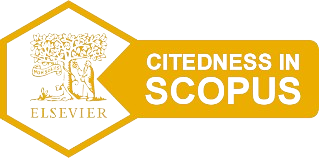Strengthening Student’s Spiritual Attitude Through Reflecting Learning Experiences by Teaching Materials Utilization
DOI:
https://doi.org/10.15408/tjems.v6i2.10978Keywords:
spiritual attitudes, experience reflections, teaching materials, sikap spiritual, refleksi pengalaman, bahan ajarAbstract
Abstract
Spiritual and social attitudes are important competencies that must be obtained by students through direct or indirect learning. Among the factors that determine the success of strengthening spiritual and social attitudes in learning are teaching materials that enable students to understand the experiences gained. The focus of this study is to strengthen students' spiritual and social attitudes through teaching materials that can make students give meaning to learning experiences. This research was conducted by observing and open questionnaire filling by students regarding the meaningfulness of teaching materials used in learning Islamic education (PAI) to strengthen the competency of spiritual attitudes and social attitudes of students. The results showed that the use of teaching materials in the student's book to reflect learning experiences and follow-up to improve their spiritual and social behaviour had fulfilled the need to reflect the values of spiritual and social attitudes from their learning experiences.
Abstrak
Sikap spiritual dan sosial adalah kompetensi penting yang harus diperoleh oleh siswa melalui pembelajaran langsung atau tidak langsung. Di antara faktor-faktor yang menentukan keberhasilan penguatan sikap spiritual dan sosial dalam belajar adalah bahan ajar yang memungkinkan siswa untuk memahami pengalaman yang diperoleh. Fokus penelitian ini adalah memperkuat sikap spiritual dan sosial siswa melalui bahan ajar yang dapat membuat siswa memberi makna pada pengalaman belajar. Penelitian ini dilakukan dengan mengobservasi dan pengisian quesioner oleh siswa mengenai kebermaknaan bahan ajar yang digunakan dalam belajar PAI untuk menguatkan kompetensi sikap spiritual dan sikap sosial siswa. Hasil penelitian menunjukkan bahwa pemanfaatan bahan ajar yang ada pada buku siswa untuk memaknai pengalaman belajar dan tindak lanjut bagi perbaikan perilaku spiritual dan sosial mereka, belum memenuhi kebutuhan refleksi nilai-nilai sikap spiritual dan sosial dari pengalaman belajar mereka.
How to Cite: Nursobah, A., Suhartini, A., Basri, H., Hayat, T. (2019). Strengthening Student’s Spiritual Attitude Through Reflecting Learning Experiences by Teaching Materials Utilization. TARBIYA: Journal of Education in Muslim Society, 6(2), 117-133. doi:10.15408/tjems.v6i2. 11915.
References
Abdullah, A. H., & Halabi, K. A. (2017). The Wisdom: A Concept of Character Building Based on Islamic View. International Journal of Academic Research in Business and Social Sciences, 7(5). https://doi.org/10.6007/IJARBSS/v7-i5/2979
Agung S, L. (2015). The Development of Local Wisdom-Based Social Science Learning Model with Bengawan Solo as the Learning Source. American International Journal of Social Science, Vol. 4, No. 4; August 2015.
Asyafah, A. (2014). The Method of Tadabur Qur’an: What Are the Student Views? International Education Studies, 7(6). https://doi.org/10.5539/ies.v7n6p98
Bachtiar, S., Zubaidah, S., Corebima, A. D., & Indriwati, S. E. (n.d.). The spiritual and social attitudes of students towards integrated problem based learning models. 17.
Batyrzhan, M., Kulzhanova, B. R., Abzhalov, S. U., & Mukhitdinov, R. S. (2014). Significance of the Hadith of the Prophet Muhammad in Kazakh Proverbs and Sayings. Procedia - Social and Behavioral Sciences, 116, 4899–4904. https://doi.org/10.1016/j.sbspro.2014.01.1046
Bennett, D., Power, A., Thomson, C., Mason, B., & Bartleet, B.-L. (2016). Reflection for learning, learning for reflection: Developing Indigenous competencies in higher education. 21.
Đurišić, M., & Bunijevac, M. (2017). Parental Involvement as a Important Factor for Successful Education. C e p s Journal, 17.
Grossmann, I. (2017). Wisdom and how to cultivate it: Review of emerging evidence for a constructivist model of wise thinking. European Psychologist.
Hajhosseiny, M. (2012). The Effect of Dialogic Teaching on Students’ Critical Thinking Disposition. Procedia - Social and Behavioral Sciences, 69, 1358–1368. https://doi.org/10.1016/j.sbspro.2012.12.073
Kolb, D. A. (2014). Experiential Learning: Experience As The Source Of Learning And Development.
M.S., A., S.H.S., O., Al-Shafi’i, M. M. O., Shuhari, M. H., Harun, N., Jusoh, W. H. W., & Zin, A. D. M. (2018). Contemplation as a Mean to Achieve Recognition of Allah. International Journal of Academic Research in Business and Social Sciences, 8(10). https://doi.org/10.6007/IJARBSS/v8-i10/4718
Muhamad, B., & Saparahayuningsih, S. (2016). An Attitude and Character Instructional Development Based on Curriculum 2013 in Elementary School. Creative Education, 07(02), 269–277. https://doi.org/10.4236/ce.2016.72025
Özdemir, S. (2018). The Effect of Summarization Strategies Teaching on Strategy Usage and Narrative Text Summarization Success. Universal Journal of Educational Research, 6(10), 2199–2209. https://doi.org/10.13189/ujer.2018.061018
Porumbu, D., & Necşoi, D. V. (2013). Relationship between Parental Involvement/Attitude and Children’s School Achievements. Procedia - Social and Behavioral Sciences, 76, 706–710. https://doi.org/10.1016/j.sbspro.2013.04.191.
Salim, S., & Abdullah, S. F. (2014). The Contemplative Intelligence In The Quran And Sunnah And Its Role In Knowlledge Acquisition. International Journal of Asian Social Science, 15.
Susilo, T., & Suryawan, A. (2018). An analysis of teacher’s preparation in implementing 2013 revision edition curriculum on mathematics specialization learning. Journal of Physics: Conference Series, 1022, 012013. https://doi.org/10.1088/1742-6596/1022/1/012013.











